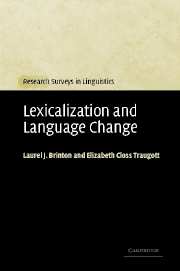Book contents
- Frontmatter
- Contents
- List of figures
- List of tables
- Preface
- List of abbreviations
- 1 Theoretical contexts for the study of lexicalization and grammaticalization
- 2 Lexicalization: definitions and viewpoints
- 3 Views on the relation of lexicalization to grammaticalization
- 4 Toward an integrated approach to lexicalization and grammaticalization
- 5 Case studies
- 6 Conclusion and research questions
- References
- Index of names
- Index of subjects
- Index of words and forms
5 - Case studies
Published online by Cambridge University Press: 03 February 2010
- Frontmatter
- Contents
- List of figures
- List of tables
- Preface
- List of abbreviations
- 1 Theoretical contexts for the study of lexicalization and grammaticalization
- 2 Lexicalization: definitions and viewpoints
- 3 Views on the relation of lexicalization to grammaticalization
- 4 Toward an integrated approach to lexicalization and grammaticalization
- 5 Case studies
- 6 Conclusion and research questions
- References
- Index of names
- Index of subjects
- Index of words and forms
Summary
Introduction
In this chapter we discuss a number of examples from the history of English which illustrate some particularly gray areas between lexicalization and grammaticalization. We start with the development of present participles (5.1), then move on to multi-word verbs (5.2), composite predicates (5.3), adverbs formed with -ly (5.4), and discourse markers (5.5). Insofar as possible we suggest solutions, though several particular questions still remain.
Present participles
Participles figure in several discussions of lexicalization and grammaticalization because the forms often have a variety of functions. We have mentioned two such instances: the possible development of the Latin inflectional present participle into an Italian derivational morpheme (see Luraghi 1998, cited in 3.3.1), and the cline in English of deverbal prepositions ending in -ing (4.1). Here we briefly consider issues related to present participial adjectives (PrP Adjs) in English such as fascinating, present participial prepositions such as during, conjunctions (Conjs) such as concerning, and degree adverbs like piping as in piping hot.
In PDE it is usual (see Huddleston and Pullum 2002:80–81) to contrast verb-forms and present participial Adjs in uses such as:
(1) a. They were entertaining the kids with their puppets. (V-form)
b. They were very entertaining puppets. (PrP Adj)
By contrast,
(2) Anne was entertaining.
is ambiguous (she could have been entertaining guests, or she could have seemed amusing). The V-form is aspectual while the present participial Adj is not.
- Type
- Chapter
- Information
- Lexicalization and Language Change , pp. 111 - 140Publisher: Cambridge University PressPrint publication year: 2005

